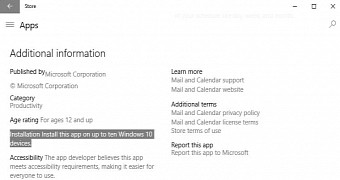Windows 10 has received thousands of improvements supposed to overhaul the experience on the desktop and on the tablet, but one subtle modification that the company appears to be preparing for the final version of the operating system might not be really pleasing to some.
Starting with Windows 10, Microsoft will allow users to install the same app only on 10 devices with the same Microsoft Account, down from no less than 81 in Windows 8.1 (via Neowin).
In other words, if you have a PC, a tablet, and a smartphone, and you install the same app on all of them, you have only 7 more installations left for this particular program, so there shouldn’t be a problem for the typical Windows 10 users.
The question is now how many people actually want to install the same app on more than 10 devices with the same MSA. While most users have a PC/laptop, a smartphone, and a tablet running Windows, a maximum of 3 installs per app would be enough, but in the case of shared accounts, this could indeed be a problem.
There are families, companies, or organizations that are using the same account for multiple devices, so this new limitation might be a problem for all them. Of course, you are allowed to choose which devices are registered for every app and you have full control from the web control panel of your MSA.
Universal apps
In Windows 10, Microsoft is going all in on universal apps, as the very same app will work across all devices running the new operating, including PCs, tablets, and smartphones.
They will share the most part of the code, so it’ll be easy to build universal apps, Microsoft says, and some of the programs that come pre-installed in Windows 10 are already based on this approach, including Edge, Mail, and Calendar.
Windows 10 will debut in less than 10 days, but it’ll be interesting to see if this new strategy addresses the lack of apps issue that impacted modern Windows’ adoption.

 14 DAY TRIAL //
14 DAY TRIAL //